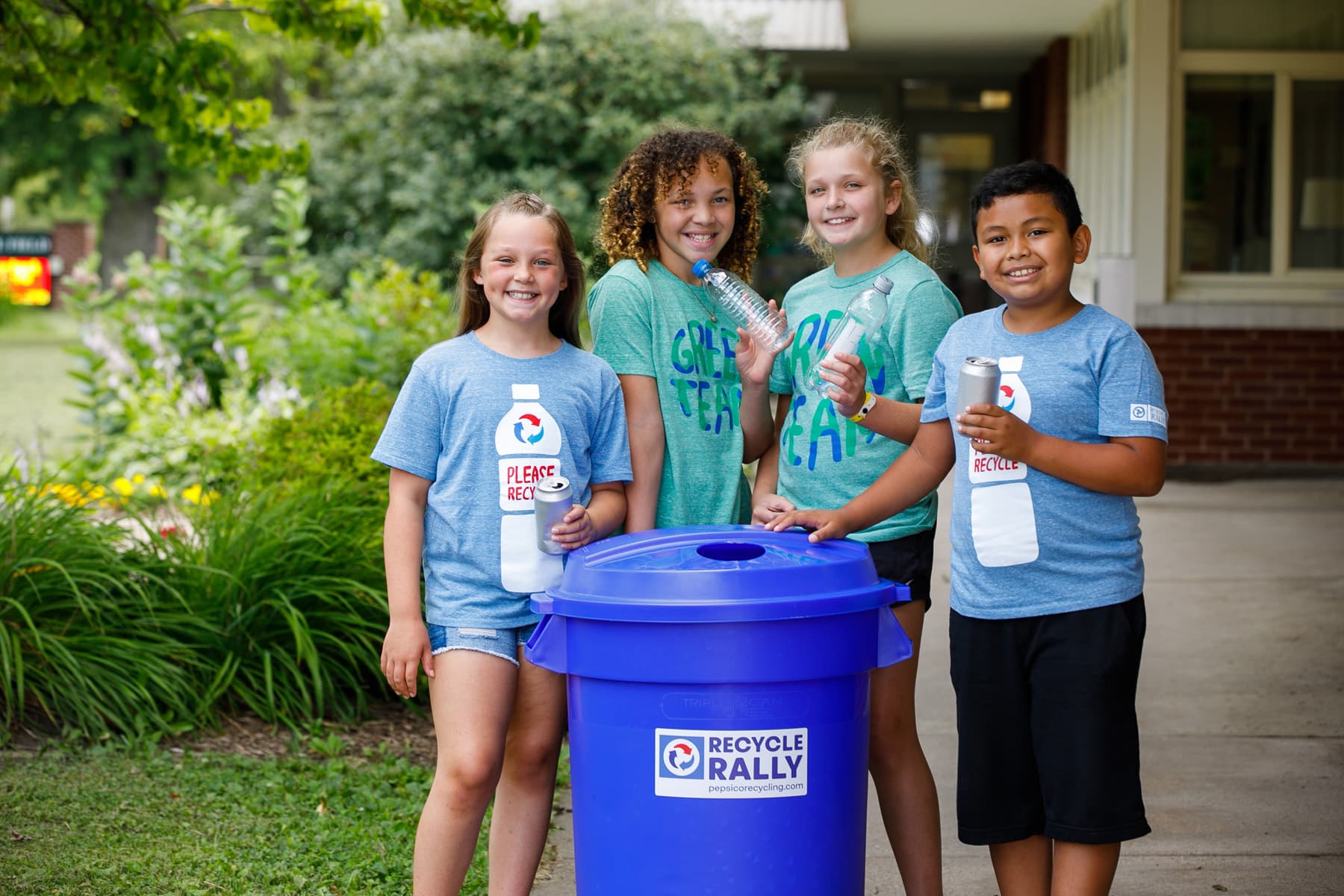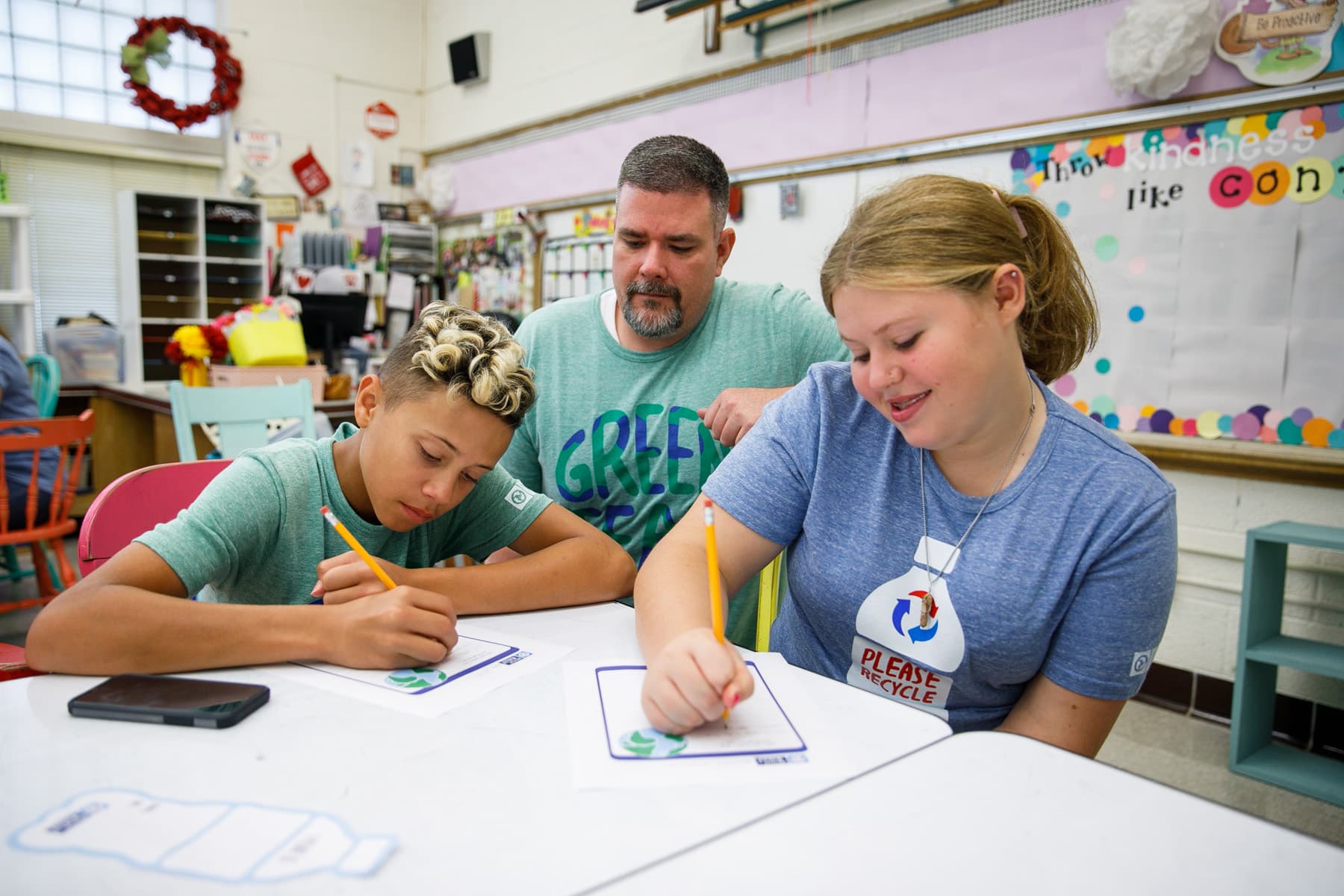Here’s How to Do a Waste Audit At Your School
Are you making the most of your recycling program?

A school waste audit is a great way to determine what’s being thrown away in your school every day. Performing one can be a truly eye-opening experience that serves as a roadmap to reduce waste and improve recycling program success. Part environmentalism, part archeology, you’ll take on the role of a detective as you dig through bins to conduct your investigation. The results will be eye-opening!
How many disposable cups and food wrappers are being thrown away at your school? How much uneaten food is going to waste? Are unused items ending up in your trash cans? The answers to these questions — and more — might surprise you. Want to find out what’s really going on? Conduct a school waste audit.
What is the goal of school waste audits?
Want to get your recycling program off the ground? Most people are unaware of how much waste they are producing, but taking inventory of what’s in a school’s trash cans will paint a clear picture.

Before you get started, you’ll need to figure out your goal and the type of waste audit you should perform. As you work through the process, consider the following:
- Are you trying to determine the total quantity of waste produced at school? Try a Quick Performance Check.
- Want to measure the effectiveness of your bin location and recycling strategy? Consider the Quick Setup Analysis.
- Did everything that needed to get recycled actually get recycled? Perform the Opportunity Assessment.
- Why is one part of the school recycling better than the other? Do a Zone Assessment to find out!
- Are you throwing away recycling that’s been contaminated by trash? Do the Complete Setup Analysis to get back on track.
- Want to know how you can do more as an individual? The Personal Waste Audit might be right for you!
School waste audits are also an essential component of a carbon footprint analysis. The results can help influence stakeholders, like the principal, school district, superintendent, or policymakers, to make a change.
Additionally, a school waste audit acts as a baseline for future comparison when working towards a specific goal. This can guide behavior or procedural changes while improving bin placement and communication.
An audit can also serve as a benchmark and may even create friendly intraschool or interschool competition. The outcome of a waste audit may reveal opportunities for improvement and even provides a foundation for working towards becoming a zero waste school.
How to start a waste audit
Your school’s specific objectives will be what guides you through the process. You’ll need to check locally to determine what can be recycled in your area, but generally, the process will be similar for most schools.

Use a waste audit form to help you stay organized and on track. You’ll want to specify whether you are auditing your entire school, a classroom, or your cafeteria. Then you’ll need to decide whether you are weighing materials or counting them. For accuracy and consistency, be sure to utilize the same unit of measurement across all material types.
What equipment is needed?
Before you begin your school waste audit, gather everything you’ll need. Fortunately, you should be able to easily find these items in your classrooms, custodial closets, or at home.
- Datasheets (printed or digital)
- Disposable gloves
- Goggles
- Plastic tarp
- Scales for weighing
- Small bucket for liquids
- Bins for sorting
- Waste category signs (a fun project for the classroom!)
- Clear plastic bags
- Mop and cleaning supplies
- Hand sanitizer
- Aprons (optional)
It’s a good idea to have a dedicated team performing the audit — and it’s always easier to work in groups! Create a system or workflow that is sanitary and efficient. Choose team members who will stay clean during the waste audit so that they can enter information onto the data sheets and/or handle devices.
What type of waste audit is right for your school?
Waste audits are performed with specific goals in mind. Therefore, you’ll need to choose an approach that fits your school’s particular needs. Here are a few scenarios to help you find the right strategy.
Do a Quick Performance Check
This light version of a waste audit is perfect for providing a total overview of how effectively your school is diverting material from landfills. A significant benefit is that this type of audit is quick and easy to do. A disadvantage is that a quick performance check only offers a snapshot of your performance. It doesn’t provide specific information about materials or locations, nor does it provide insight into how you could perform in the future.
This is still a great place to start, though! To accomplish this audit, use a waste audit form for materials and break up your school into zones such as the cafeteria, hallways, and classrooms. You may discover that each zone has a very different diversion rate.
Make it fun: After you have a baseline, consider turning it into a competition. Track and post each zone’s diversion rate over time, build awareness, and find ways to improve the results!

Evaluate potential with an Opportunity Assessment
If your school recycling program is already performing well, a waste audit to identify missed opportunities could help take your efforts to the next level. This type of audit is all about materials — where you’re collecting and how you’re collecting. It provides an opportunity to discover which materials you’re doing a great job of collecting and which ones you are missing completely. The results of this kind of study help uncover your school’s true recycling potential.
If you invested more time, energy, and money, how could you improve and perfect your program? Could the gunky, nasty food containers that get tagged as garbage be cleaned out and added to a recycling bin? Are there ways to make recycling at your school easier and more foolproof? A missed opportunity assessment can help you take action.
Perform a Quick Setup Analysis
Do you have enough recycling bins, and are they in the right places? Evaluate their design, placement, and signage by using a bin audit form. This will give you an idea of how well your recycling setup is performing. Best of all, figuring out whether your bin placement is effective is simple. Since the Quick Setup Analysis is not about what’s in your bins, you won’t even have to get your hands dirty!
Make it fun: This is another type of audit that would be perfect for a contest! Look at the items placed in bins designated for paper, plastic bottles, and other recyclables. Has anything ended up in the wrong bin? If so, you’ll have a better idea of how and where to improve communication. This bin placement guide can also help!
Conduct a Complete Setup Analysis
While no waste audit will ever truly be complete, the Complete Setup Analysis provides an in-depth look at the level of contaminants in each stream. This type of audit is similar to the Opportunity Assessment, but the focus is on contamination instead of volume.
Is your recycling ending up in the trash? Is your trash ending up in the recycling? This is often a symptom of a poor recycling setup. It’s also a problem that needs to be addressed to prevent your recycling from being contaminated and, therefore, sent to the landfill. This type of waste audit will definitely reveal the ways you can improve.
Use a Zone Assessment
Is your recycling bin and signage placement working? Use a waste audit form to compare the collection rates of zones where bins and signs have been placed next to trash cans versus areas where they’ve been placed elsewhere. This Zone Assessment can help you determine how many bins and what signage you need to improve the effectiveness of your recycling program.
Is the cafeteria recycling more effectively than the classrooms? Which one has the higher collection rate? This flexible type of school waste audit can be very detailed (broken up by material, for example), or can be used to find the total volume in a specific zone. Ultimately, the goal is to answer the question — does one zone perform better than the other with the same setup?
Try a Reuse Assessment
A Reuse Assessment prompts you to look at the types of waste your school is generating — is it possible for any of those items to be reused? Could you replace disposable items with things that can be used over and over again?
For example, swapping styrofoam cafeteria trays for plastic ones may dramatically reduce the total waste being produced by your school. Looking for similar opportunities is the goal of this type of audit.
Commit to a Personal Waste Audit
This type of waste audit is not about your school. It is, however, about what you can do as an individual to evaluate and reduce the amount of waste you are generating. Use this Personal Waste Audit form as a way to include middle school students in this informative activity.
How often should it be done?
It’s a good idea to conduct a school waste audit at least once a year. Even if you don’t make any changes, you can evaluate whether your school has become more efficient or effective. To take it to the next level, an audit can be performed each semester. Incentivize and add a fun element to the process by making it a competition — did you improve in the spring over the fall?

Some schools may not have the time or resources to perform a full waste audit. In these cases, even a lighter version can provide valuable insight. Consider conducting informational interviews of the custodial staff or simply weigh what’s being recycled instead of counting items individually.
Avoid these school waste audit pitfalls
One of the biggest, most common mistakes is failing to have a clear goal. During the school waste audit process, questions will undoubtedly arise. How should this material be categorized? Is it better to weigh or count a certain type of waste? Without a clear primary goal, answering these questions might be tricky.
- Evaluate your plan early in the process to identify any problems. It’s better to make changes right away than to get halfway through and realize you should have done it differently.
- Use a consistent method of quantifying throughout the process.
- Make sure the entire team is classifying, measuring, and tallying things the same way.
- Categorize all of the waste before you start tallying and inputting data.
Additionally, not every school week is the same, so it’s important that any follow-up audits are conducted under the same or similar circumstances as the first time. Your school will likely produce less waste during a four-day week and substantially more during the holidays or following special events. To be most accurate, perform audits at the same time of day on the same day of a normal five-day school week.
How it can save your school and the planet
School waste audits can be messy and time-consuming but perform a valuable function. They provide a clear picture of how a school’s recycling program is performing and reveal areas where improvements can be made. If you’ve been trying to make a case for more recycling bins, a waste audit can help demonstrate the need.

Seeing how much trash your school produces can also raise important questions about how much is being spent on waste removal services. Could recycling costs be offset by the savings generated from having less trash? Is there a potential path to saving money in the future? Will more recycling bins cut down on the labor costs (and mess!) associated with waste management at your school?
A school waste audit may not solve all your problems, but it can help start the right conversations. Your efforts will give you the information you need to make important changes that protect the environment!
Learn More

Recycle Rally
Recycle Rally is a free K-12 program that provides rewards and tools to help enhance recycling at your school!
Explore now
Additional Resources
Our comprehensive library of resources was designed to inspire the next generation of green leaders.
Explore now
